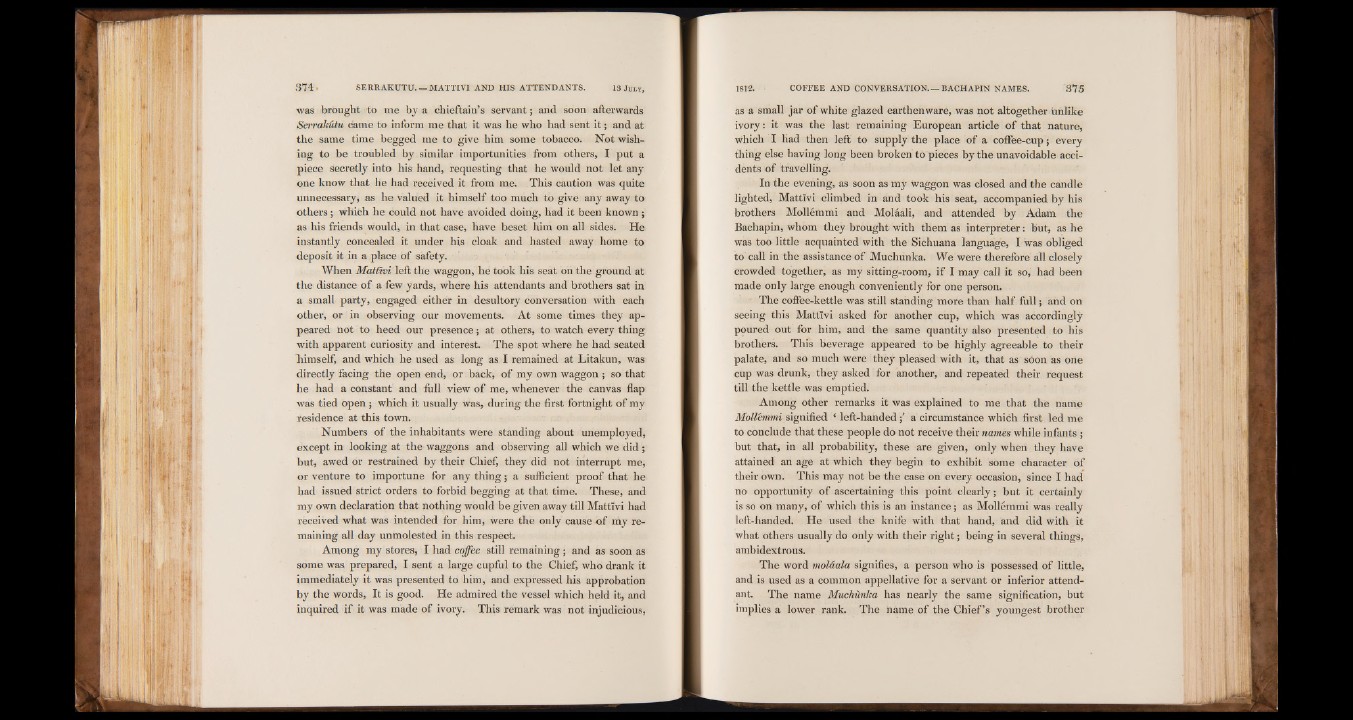
was brought to me by a chieftain’s servant; and soon afterwards
Sen'alcutu came to inform me that it was he who had sent it ; and at
the same time begged me to give him some tobacco. Not wishing
to be troubled by similar importunities from others, I put a
piece secretly into his hand, requesting that he would not let any
one know that he had received it from me. This caution was quite
unnecessary, as he valued it himself too much to give any away to
others; which he could not have avoided doing, had it been known ;
as his friends would, in that case, have beset him on all sides. He
instantly concealed it under his cloak and hasted away home to
deposit it in a place of safety.
When Mattivi left the waggon, he took his seat on the ground at
the distance of a few yards, where his attendants and brothers sat in
a small party, engaged either in desultory conversation with each
other, or in observing our movements. At some times they appeared
not to heed our presence; at others, to watch every thing
with apparent curiosity and interest. The spot where he had seated
liimself, and which he used as long as I remained at Litakun, was
directly facing the open end, or back, of my own waggon ; so that
he had a constant and full view of me, whenever the canvas flap
was tied open; which it usually was, during the first fortnight of my
residence at this town.
Numbers of the inhabitants were standing about unemployed,
except in looking at the waggons and observing all which we did;
but, awed or restrained by their Chief, they did not interrupt me,
or venture to importune for any thing; a sufficient proof that he
had issued strict orders to forbid begging at that time. These, and
my own declaration that nothing would be given away till Mattivi had
received what was intended for him, were the only cause of my remaining
all day unmolested in this respect.
Among my stores, I had coffee still remaining ; and as soon as
some was prepared, I sent a large cupful to the Chief, who drank it
immediately it was presented to him, and expressed his approbation
by the words, It is good. He admired the vessel which held it, and
inquired if it was made of ivory. This remark was not injudicious,
as a small jar of white glazed earthenware, was not altogether unlike
ivory: it was the last remaining European article of that nature,
which I had then left to supply the place of a coffee-cup ; every
thing else having long been broken to pieces by the unavoidable accidents
of travelling.
In the evening, as soon as my waggon was closed and the candle
lighted, Mattivi climbed in and took his seat, accompanied by his
brothers Mollemmi and Molaali, and attended by Adam the
Bachapin, whom they brought with them as interpreter: but, as he
was too little acquainted with the Sichuana language, I was obliged
to call in the assistance of Muchunka. We were therefore all closely
crowded together, as my sitting-room, if I may call it so, had been
made only large enough conveniently for one person.
The coffee-kettle was still standing more than half full; and on
seeing this Mattivi asked for another cup, which was accordingly
poured out for him, and the same quantity also presented to his
brothers. This beverage appeared to be highly agreeable to their
palate, and so much were they pleased with it, that as soon as one
cup was drunk, they asked for another, and repeated their request
till the kettle was emptied.
Among other remarks it was explained to me that the name
Mollemmi signified ‘ left-handed a circumstance which first led me
to conclude that these people do not receive their names while infants ;
but that, in all probability, these are given, only when they have
attained an age at which they begin to exhibit some character of
their own. This may not be the case on every occasion, since I had
no opportunity of ascertaining this point clearly; but it certainly
is so on many, of which this is an instance; as Mollemmi was really
left-handed. He used the knife with that hand, and did with it
what others usually do only with their right; being in several things,
ambidextrous.
The word molaala signifies, a person who is possessed of little,
and is used as a common appellative for a servant or inferior attendant.
The name MuchUnka has nearly the same signification, but
implies a lower rank. The name of the Chief’s youngest brother